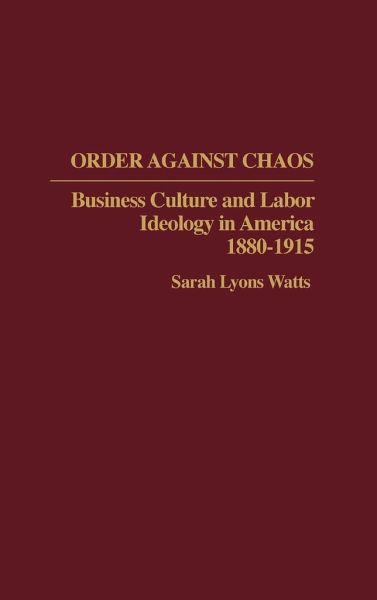
Order Against Chaos
Business Culture and Labor Ideology in America, 1880-1915
Versandkostenfrei!
Versandfertig in 1-2 Wochen
87,99 €
inkl. MwSt.

PAYBACK Punkte
44 °P sammeln!
Historians now mark the years between 1880 and 1915 as the beginning of mass culture in the United States and its consolidation under the ideals and values of private corporations. In this study, Sarah Lyons Watts contends that modern American attitudes toward the relationship between labor and capital, as well toward the place industrial labor was to occupy in the corporate state, coalesced in the debates in popular, business, and professional literature in the decades around the turn of the century. She illustrates how the magnitude and significance of changes in the transmission of cultural...
Historians now mark the years between 1880 and 1915 as the beginning of mass culture in the United States and its consolidation under the ideals and values of private corporations. In this study, Sarah Lyons Watts contends that modern American attitudes toward the relationship between labor and capital, as well toward the place industrial labor was to occupy in the corporate state, coalesced in the debates in popular, business, and professional literature in the decades around the turn of the century. She illustrates how the magnitude and significance of changes in the transmission of cultural authority made these years critical in the evolution of industrialists' labor ideas. Following a detailed introduction that provides an overview of the period and a discussion of cultural hegemony, Watts focuses on three case studies: the Pullman strike, an ideological struggle in which public opinion figured not just in the outcome of the strike, but in the definition of labor's place in the corporate order; modern management, which sought to replace workers' traditional definitions with its own and transform the ethos of modern factory work; and the National Association of Manufacturers' anti-union campaign. These case studies demonstrate how nationwide organizations of businessmen met the charges against concentrated capital made by unionists and reformers, advancing arguments that linked the moral value of capital to civic services, national honor, and progress. A concluding chapter, recounting the dramatic social reorganization that was the ultimate product of this period, and a selected bibliography, complete the work. This book will be a useful reference for courses in American, business, social, and labor history, as well as an important resource for public and academic libraries.












